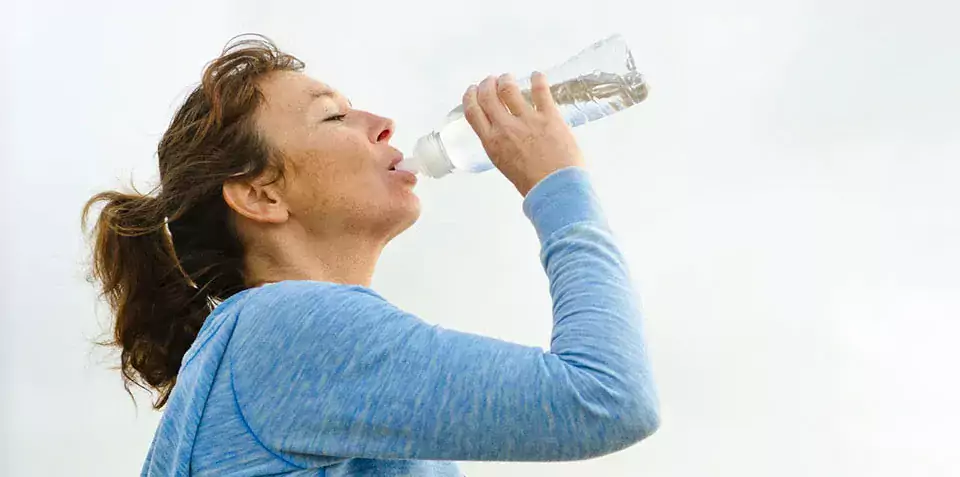Stop gulping away – you're not short of water
Water is essential for life, but we don't need large quantities to keep us going; on the contrary, over-hydrating can be dangerous. Water and liquids should be drunk and given in moderation, researchers believe.

Text: Sara Nilsson 2023.
Bringing a bottle of water - in your workout bag, on your desk at work or on your desk at school - is a common sight today. People drink water here and there, have apps that remind them to drink and media advises us to drink more water.
But although water is crucial for good health and life, water shortage is rarely a problem to health among young individuals in Sweden," says Mattias Carlström, Professor of Cardiorenal Physiology at the Department of Physiology and Pharmacology, Karolinska Institutet.
"Healthy adults as a rule do not have to worry about not drinking enough water. We get the liquid that we need from eating and drinking normally, unless there are special circumstances," he says and continues:

"In all likelihood, it's not dangerous to walk around with a bottle and take a sip every now and then, but it's probably not necessary either.
In an adult person, around 60 percent of their body weight consists of water. That volume varies with, for example, gender, age, percentage of body fat and muscle mass. Newborns consist of around 80 percent water and men generally have more water in their body than women since muscles bind more water than fat.
Water exists in our entire body. It exists for the most part in the cells, but also in tissue, blood and other body fluids. It has several different functions and plays a crucial role in many biological processes. Water is a solvent that helps transport nutrients, minerals and oxygen to the correct locations in the body. The body uses water to rid itself of waste products, such as urine, which primarily consists of water.
The body needs to maintain the right balance between water, salt and minerals inside and outside the cells, and water is an important component for a normal blood pressure.
It also helps to regulate our body temperature. If we get too hot the body exudes sweat, which consists of water and salt. When water evaporates it chills the blood in the skin's blood arteries.
Drink when you are thirsty
How much water we need to consume each day varies from person to person and is, among other things, affected by age, body weight, health, physical activity, diet and surrounding temperature. The need for liquids varies to a high degree. For example, a person with a sedentary job in a cool office may barely need one litre per day, while a physically active person in a warm, humid climate may need may need significantly more water per day.

A general guideline is that a healthy adult needs around two litres of water per day, or 30-34 millilitres per kilogram of body weight. That includes both the liquid from what we eat, which may be roughly one litre per day, and from what we drink.
"But rather than staring ourselves blind at drinking a certain volume every day, it's often enough to drink when you feel thirsty," says Rafael Krmar, researcher, tied to the Department of Physiology and Pharmacology, Karolinska Institutet, and pediatrician as well as pediatric nephrologist at the pharmaceutical company SOBI and paediatrics hospital Martina in Stockholm.
Feeling thirsty is an indicator that the body needs fluids and a signal that you should drink more.
As we get older, our ability to feel thirst and regulate our body temperature through normal sweating often deteriorates. Older people are therefore more vulnerable to heat stress and water imbalance and more vulnerable to, for example, heat waves.
"It might be useful to know your own body and your normal needs for daily water intake to avoid getting dehydrated," Mattias Carlström explains.
Children also have less ability to feel thirst and young children might find it hard to communicate that they are thirsty.
Monitor your pee
An easy way to find out whether you are drinking enough is to monitor your pee.
"If the urine is light yellow and you are peeing regularly throughout the day, you are definitely not lacking water, But if your pee is really dark yellow in the middle of the day it might be a sign that you have not had enough to drink," says Mattias Carlström.
The risk of dehydration increases if you have vomited, have diarrhoea or are taking drugs that have a diuretic effect. This also applies to poorly managed diabetes, which results in high blood sugar. The body then excretes the excess sugar through urine, which draws fluid out of the body. The risk of dehydration also increases with certain renal diseases and diabetes insipidus, a rather rare disease where one of the symptoms is an increase in urine.
If you have not had enough fluids, the initial symptoms are rather diffuse. You may experience a headache, dry mouth and you normally feel tired and unfocused. At first, dehydration is compensated for by the body redistributing water and salts and using parts of the water that is normally in the cells. If you are seriously dehydrated this will not be enough and several of the bodily functions will be impaired. You may experience an increased heart rate, confusion and lose consciousness.
Regular water is sufficient
On a sunny summer day, a cold beer might feel tempting when you are thirsty. However, beer, like any alcoholic beverage, is not an optimal thirst quencher. Alcohol actually inhibits the release of a hormone that regulates urine production and the body's water balance, which may lead to an increase in urine production.
"If you are dehydrated and drink beer, you hydrate the body at first, since beer contains water. However, a few hours later you will have peed out the volume of beer you drank plus some fluids, so all in all it's a loss of fluids," Mattias Carlström explains.
The caffeine in coffee and tea also makes you want to pee faster, but in people who regularly drink it that effect is less pronounced.
"Contain electrolytes" is a common selling point for sport beverages today. While it is true that electrolytes, in other words minerals and salts, such a sodium, potassium and calcium, are necessary for the body, in connection to most physical activities it is often enough to drink regular water without anything added to it," says Mattias Carlström.
"When it comes to regular exercise, water is sufficient. Our diet normally contains enough of the salts and minerals that we need, even if we sweat a lot. It is not until you engage in more serious physical exertion - longer and/or more intense - that you may need to replace lost electrolytes," he says.
Life threatening dehydration
In general, healthy adults usually have a strong tolerance when it comes to water - we can drink a bit too much or too little without it being life-threatening. Although in recent years, reports have come in that indicate that it may be harmful to be thirsty often or for too long," says Rafael Krmar. Studies have shown that the hormones that are secreted when we are thirsty might have a negative effect on cells and the hypothesis is that it would be harmful to the body if these hormone levels stay high for a prolonged period of time.
"We most often drink when we are thirsty. But in regions where there is not free access to clean water this might become a serious problems, especially when temperatures across the world are rising," Rafael Krmar explains.
Dehydration has also been known to cause the development of a type of renal disease among young agricultural workers in Central America and Mexico. There have been numerous theories on what has caused these otherwise healthy individuals to develop renal disease and die. Researchers at Karolinska Institutet have contributed with important knowledge on the disease, which has been named Mesoamerican nephropathy.
In all likelihood, the disease is caused by the workers not drinking enough water and salt during long workdays in high temperatures, which causes serious damage to the kidneys. Regular over-the-counter NSAID painkillers which many workers take to be able to manage the hard work, may also make the situation worse since they have a negative impact on renal function.
"This emphasises the importance of work conditions that ensure that workers are given enough breaks and water to drink," says Rafael Krmar.
Generally an adult individual can survive without fluids for roughly three to five days. However, that time varies depending on a number of different factors, such as the person's health, what type of activity they are performing and the surrounding temperature.
If you yourself ever end up in an emergency situation without access to fluids, there are a few things you should keep in mind. To reduce sweating you should stay in the shade and minimise physical exertion. Do not pee unnecessarily. If you only have access to a limited amount of water it is best not to drink everything at once, but instead portion it out.
"If you drink a little at a time the kidneys will program themselves to conserve water. That will give you a prolonged effect from what little water is added. If you suddenly drink an entire litre of water, the body will instead think that there is plenty of water and will dispose of most of it,"says Mattias Carlström.
And do not drink your pee, Mattias Carlström and Rafael Krmar both emphasise.
"Urine contains waste products that the body is trying to get rid of, and might also contain bacteria, so if you drink it you risk getting poisoning. In an emergency situation of water shortage, the urine is also highly concentrated - it contains a lot of salts - so the net effect will be that it costs the body more water to dispose of the salts than what is added," says Rafael Krmar.
Unlike certain other mammals, humans cannot store much water in their bodies for later use. Our stomach and intestine can also only absorb around a half a litre of fluids per hour. That's why there is no use trying to drink large amounts in advance before a long-distance race or other extreme physical exertion," Mattias Carlström explains.
"Instead, you should replace it with a reasonable amount of fluid, and in some cases also electrolytes while you are running and, if needed, enlist the help of a sports doctor or dietician to plan out how you should drink. Occasionally runners are brought to hospital for both under-hydration and over-hydration," he says.
The brain might be damaged
While it is crucial to our health that we drink enough water, it is also life threatening to drink too much. If it does not involve enormous amounts, we manage to regulate the excess by peeing it out. However, the kidneys cannot filter more than roughly 20-25 litres per day and along with the water goes salts from the water.
A person who drinks too much water in a short period of time may suffer what is called water poisoning, which means that the water level in the body becomes too high in relation to the sodium level in the blood. This condition is acute and potentially life-threatening, with symptoms such as a headache, vomiting, muscle weakness and confusion. One of the most serious risks occurs when the brain's cells absorb water and swell. Since the brain has a limited amount of space, important structures may get caught when the cells swell, which can affect vital functions such as breathing and blood pressure.
- If, for example, you drink 5-10 litres of water in a short amount of time, within an hour or so, serious brain damage can occur. Water poisoning is dangerous but relatively rare and normally occurs in connection with extreme physical exertion. Unfortunately there have been instances where children have suffered life-threatening conditions and even died when they have competed in who can drink the most glasses of water in a short period of time," Mattias Carlström explains.
Certain chronic diseases are also associated with a risk of over-hydration and patients are advised to be cautious with their water intake.
More reading
 Photo: Joel Nilsson
Photo: Joel NilssonHot days put our bodies to the test
Bathing in the coldest of waters and disappointed faces when clouds cover the sun. The Swedes worship warm summer weather. But heat waves are expected to become increasingly common in the future – and we need to start learning about the dangers of high temperatures.
